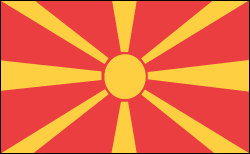Macedonia News & Current Events


Establishing Independence
On Sept. 8, 1991, Macedonia declared its independence from Yugoslavia and asked for recognition from the European Union nations. It became a member of the UN in 1993 under the provisional name of the Former Yugoslav Republic of Macedonia (FYROM) because Greece vociferously protested Macedonia's right to the name, which is also the name of a large northern province of Greece. To Greece, the use of the name implies Macedonia's interest in territorial expansion into the Greek province. Greece has imposed two trade embargoes against the country as a result.
Tensions Rise Between Albanians and Macedonians
Long-simmering tensions between ethnic Albanians and Macedonians reached greater heights during the Kosovo crisis, during which more than 140,000 refugees streamed into the country from neighboring Kosovo. Most of the refugees returned to Kosovo in 2000.
Violence between Albanians and Macedonians erupted in March 2001, prompting the government to send troops into the heavily Albanian western section of the country. The rebels sought greater autonomy within Macedonia. In Aug. 2001, after six months of fighting, the rebels and the Macedonian government signed a peace agreement that allowed a British-led NATO force to enter the country and disarm the guerrillas. In Nov. 2001, Macedonia's parliament agreed to constitutional amendments giving broader rights to its Albanian minority. Albanian became one of the country's two official languages.
In Sept. 2002 elections, a center-left coalition ousted the governing coalition, which had been embroiled in previous years' guerrilla insurgency. Branko Crvenkovski of the Together for Macedonia coalition became the new prime minister. In Feb. 2004, President Boris Trajkovski was killed in a plane crash. Prime Minister Crvenkovski was then elected president; three prime ministers have served under him. In Aug. 2004, Parliament approved legislation redrawing internal borders and giving ethnic Albanians more local autonomy in regions where Albanians predominate.
Macedonia was accepted as a candidate for European Union membership in December 2005. In April 2013, the EU reported that the country was on the right path toward membership.
On June 1, 2008, one person died and nine people were wounded in fighting between two ethnic Albanian groups, the Democratic Union for Integration and the Democratic Party of Albanians, during parliamentary elections. At least 17 polling stations suspended voting due to intimidation, violence, and missing ballot boxes and voting materials. The election interruption further impeded Macedonia's chance of becoming a member of the EU.
Prime Minister Nikola Gruevski, of the coalition "For a Better Macedonia" Party, won parliamentary elections on June 1, 2008, with 48% of the vote. The Democratic Union for Integration and the Democratic Party of Albanians took 11% and 10% of the vote, respectively.
Gjorgje Ivanov won the presidential election in April 2009, defeating Social Democrat Ljubomir Frckoski. Ivanov was sworn into office in May 2009.
Opposition Social Democrats Challenge Government Coalition
In January 2011, Prime Minister Gruevski called early elections following protests by the opposition Social Democrats, who also boycotted parliament over the government's attempts to shut down A1 TV, a network that supports the Social Democrats. Elections were held in June 2011, and Gruevski's VMRO-DPMNE prevailed but did not win a majority.
The Social Democrats again boycotted parliament beginning in December 2012 after a debate over the budget descended into fisticuffs. The European Union mediated the dispute, and the Social Democrats ended their boycott in March 2013.
The ruling VMRO-DPMNE dominated early elections in April 2014, with both Gruevski and President Ivanov landing a third term. The opposition Social Democrats alleged fraud. Gruevski formed a coalition with the ethnic-Albanian Democratic Union for Integration.
Zoran Zaev, leader of the Social Democrats, accused the government in January 2015 of illegally wiretapping about 20,000 people, including opposition figures, members of the media, and judges. The government denied the accusation, saying foreign spies conducted the wiretaps on behalf of Zaev. After protracted negotiations brokered by the EU, the opposing parties agreed in June 2015 to hold early elections by April 2016 and there'd be a transition period in the interim.
On Jan. 15, 2016, Prime Minister Nikola Gruevski turned in his arranged pre-electoral resignation. Three days later, Parliament approved sociologist and conservative politician Emil Dimitriev as interim prime minister with a vote of 72-0. Dimitriev would serve until April's early elections.
See also Encyclopedia: Macedonia
U.S. State Dept. Country Notes: Macedonia
State Statistical Office http://www.stat.gov.mk/english/glavna_eng.asp .







